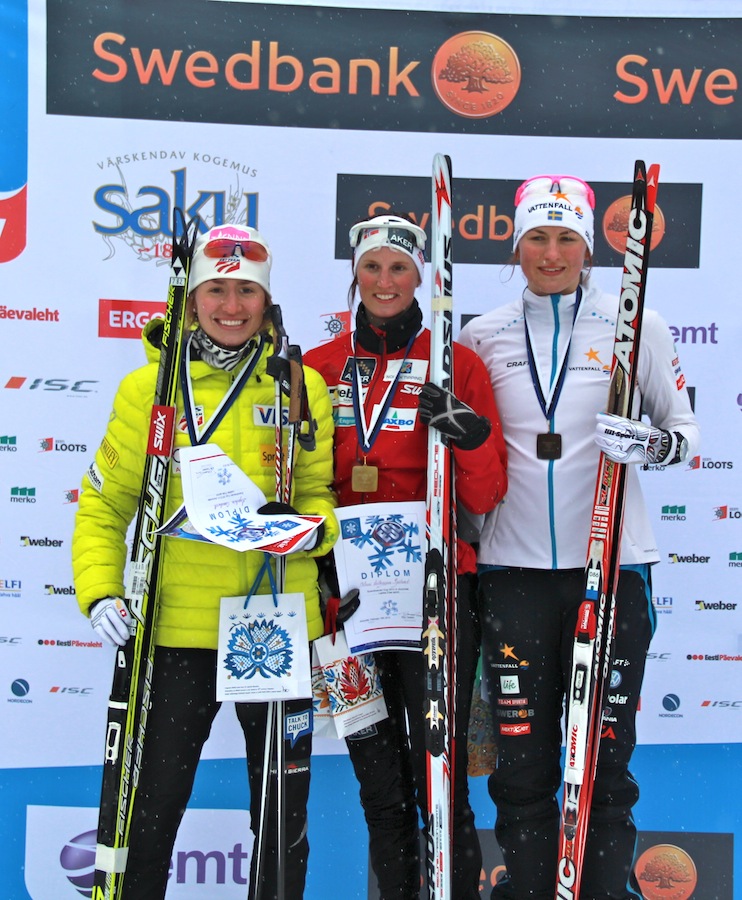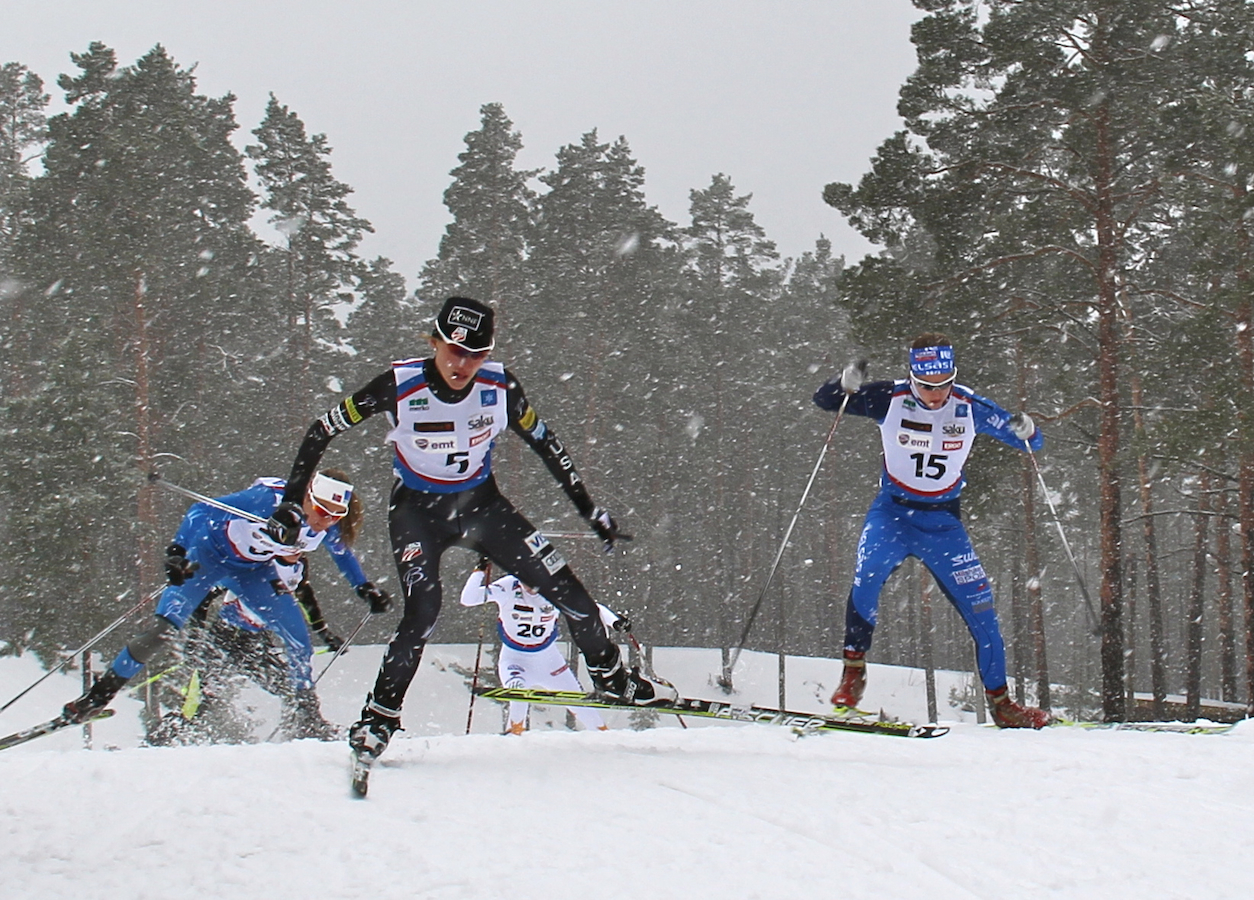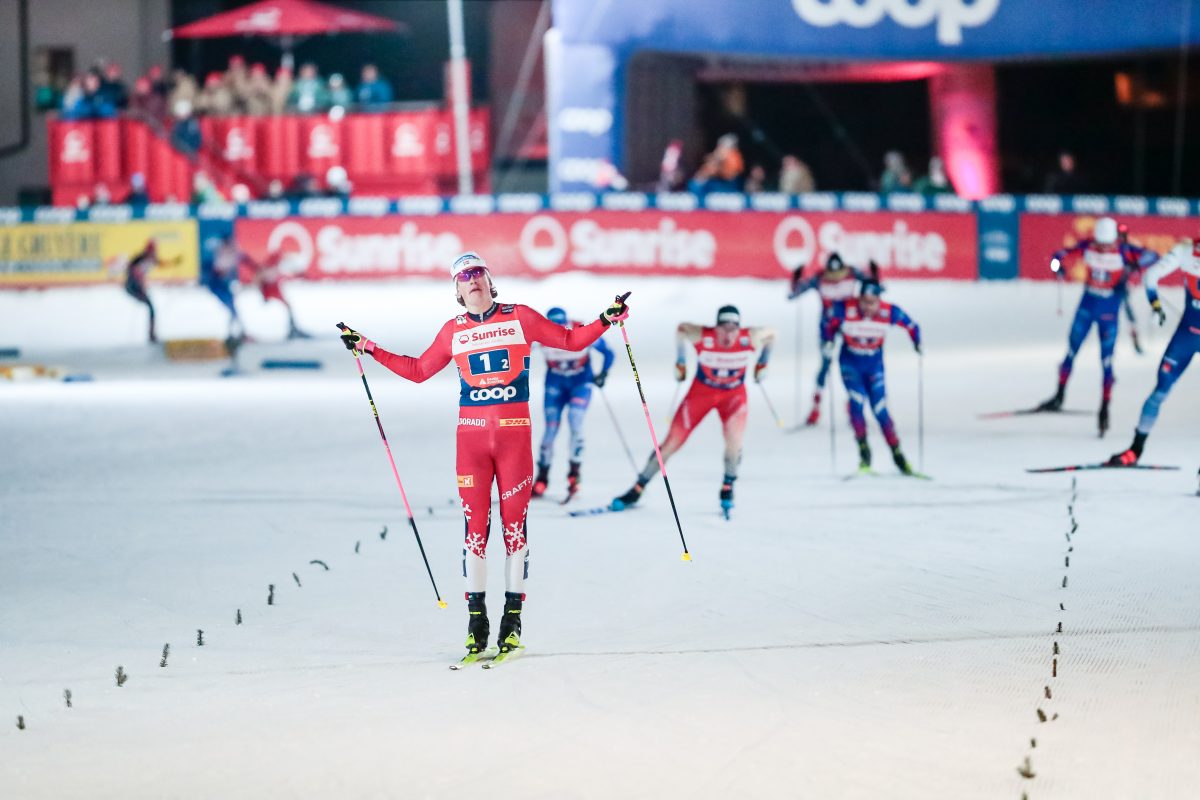
(Note: This recap has been updated to include comments from Eric Packer, Caitlin Patterson and Jennie Bender.)
Nothing beats racing with the Euros, except when you beat most of them. Sophie Caldwell of the Stratton Mountain School T2 Team (SMST2) rose to a career best at the Scandinavian “Scando” Cup on Sunday, placing second in the 1.1-kilometer freestyle sprint at the Jõulumäe Recreation Centre in Pärnu, Estonia.
The day before on a slightly longer course, Caldwell finished 17th in the 1.3 k classic sprint after qualifying in ninth. That wasn’t quite what she’d hoped for, so the 22-year-old rallied to the fifth-fastest qualifying time Sunday and employed some smart tactics in the heats that followed. Beyond brains, she used some brawn, too.
“Today definitely helped my confidence because I was not super psyched with how yesterday unfolded,” Caldwell wrote in an email on Sunday. “I’m happy to be feeling healthy again and excited to hopefully see some sun and be in Switzerland! It was fun to be able to mix it up with those girls today and I’m looking forward to getting the chance a couple more times in the next few weeks.”

The SuperTour leader, Caldwell will get some more World Cup experience next weekend in Davos, Switzerland. After that, she’ll travel with the U.S. Ski Team to Val di Fiemme, Italy, where she’ll compete at World Championships.
But this past weekend, and the last week of Scando Cup racing between Latvia and Estonia, was great practice. Caldwell led the Americans in second on Sunday, just 0.14 seconds out of first.
“Sophie made some great tactical moves throughout the rounds and almost got the win,” US Ski Team development coach Bryan Fish explained. “She was inched out at the line – an excellent performance.”
Norwegian Kari Vikhagen Gjeitnes captured her second-straight win of the weekend, and Sweden’s Linn Soemskar was third after posting the fastest qualifying time. Soemskar was seventh in the classic sprint.
On a snowy day with temperatures hovering around freezing, Caldwell said she learned her lesson in the quarterfinal after leading from start to finish.
“I knew position was important and it paid off, but it was not easy,” she wrote.
Caldwell didn’t get off to the greatest start in her semifinal, but that ended up helping as she put herself in a good drafting position and slingshot around the leaders to win the heat.
The final played out similarly as Caldwell struggled a bit from the start but focused on staying inside on the corners “and not letting people cut in or push me around,” she wrote.
“I took the inside track on the last hill and got into second place and had a sprint off down the final stretch for 1-3,” she wrote. “It was really exciting and I felt better and better as the day went on!

“I still feel like I’m learning a lot each time I race over here, but I like to think each time I’m get a little tougher,” Caldwell added. “I even gave a girl a little smack when she cut me off yesterday and then tried to ski big and hold my own today! So one step at a time but it was definitely fun to end the weekend on a high note.”
Just outside of the top 10, Jennie Bender of Central Cross Country (CXC) qualified in 11th and finished in the same position – advancing to the semifinals. The day before, she qualified fourth in the classic sprint and went on to place 16th, which Fish wrote was a “very strong result, however, I knew she felt bittersweet.”
“I wasn’t ecstatic with 11th, but I figured it could have been worse,” Bender wrote in an email, referring to the classic sprint. “It was even shorter than the classic sprint course, and you had to keep mentally in the moment 100 [percent], or time was being lost.
“I was in the semifinals with Sophie, who totally rocked it,” she added. “It was sweet having American representation on the podium. … The field was very tough, with many World Cup skiers mixed in. I cant wait to get back to Europe to race more. I think it’s quite valuable for the progress of an elite skier. ”
Caitlin Patterson (Craftsbury Green Racing Project) was certainly the most consistent of the weekend, placing 22nd in both qualifiers as well as overall in the two sprints.
Becca Rorabaugh of Alaska Pacific University (APU) qualified in 28th on Sunday and ended up 25th. She was 24th in the classic sprint after qualifying in 27th.
Anika Miller (Payette Lake Sports) also made it into the top 30, qualifying in 16th in the skate sprint and finishing 26th overall. On Saturday, she was 21st after qualifying in 20th.
- Women’s results: classic sprint | skate sprint
Saxton Leads American Men in Sprints
On the men’s side, Norway’s Tomas Northug dominated both the 1.6 k classic and freestyle sprints. The younger brother of World Champion Petter Northug, he beat teammates Eirik Lorentsen and Emil Nyeng, who were second and third respectively, on Saturday, and topped another, Sindre Bjørnsetad Skar, on Sunday along with Sweden’s Johan Edin.
Ben Saxton of F.A.S.T. Performance Training was the top finisher for the U.S., placing 33rd in the classic sprint. He was 0.78 seconds from qualifying in 30th on the challenging course – which took more than four-minutes to complete – and ranked 60th at the start. On Sunday, Saxton was 71st in the skate sprint.
Reese Hanneman (APU) led the way on Sunday, placing 42nd in the skate sprint. The day before, he was 45th. Eric Packer (SMST2) notched a personal-best Scando Cup sprint performance in 43rd Sunday after placing 58th in the skate sprint.
“I was disappointed to miss out on the heats, but it was positive to be right in the mix in such a tight field,” Packer wrote in an email. “I was just over four seconds out of the top ten, so I know I need just a few more seconds to be right in the mix with the best.”
Montana State University junior David Norris was 43rd in the classic sprint and 72nd in the skate. APU’s Forrest Mahlen was 76th on Saturday and 77th on Sunday, and teammate Jack Novak placed 83rd in the skate and 84th in the classic sprint.
“Weather played a role particularly with the men,” Fish wrote Saturday. “It was clearly klister skiing in the morning but the heavy snows started at 9AM (as predicted) prior to the start and throughout the heats.”
The weather kept the U.S. wax techs and coaches on their toes, and their athletes went with both klister and zeros.
“The venue in Estonia was awesome,” Packer wrote. “The sprint courses were some of the best and most fun I’ve ever skied. They used lots of bridges and tunnels to give almost a roller coaster feel to the courses.”
- Men’s results: classic sprint | skate sprint
Alex Kochon
Alex Kochon (alexkochon@gmail.com) is a former FasterSkier editor and roving reporter who never really lost touch with the nordic scene. A freelance writer, editor, and outdoor-loving mom of two, she lives in northeastern New York and enjoys adventuring in the Adirondacks. She shares her passion for sports and recreation as the co-founder of "Ride On! Mountain Bike Trail Guide" and a sales and content contributor at Curated.com. When she's not skiing or chasing her kids around, Alex assists authors as a production and marketing coordinator for iPub Global Connection.



